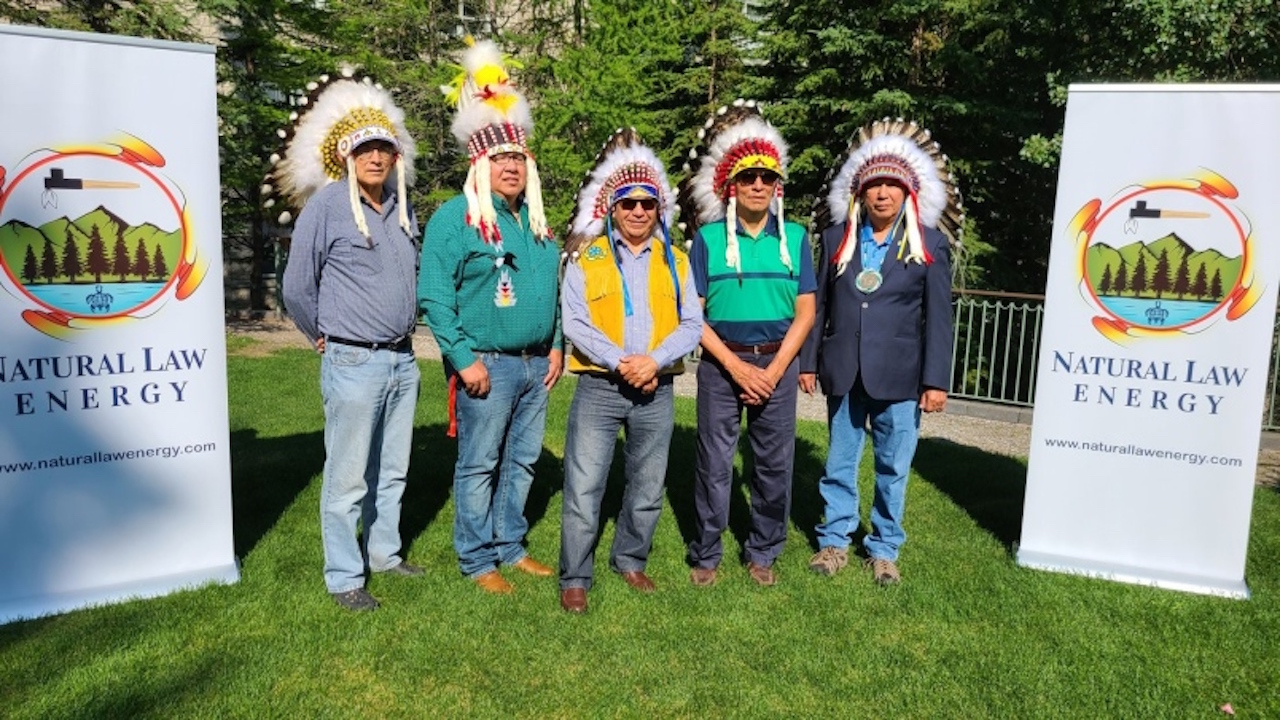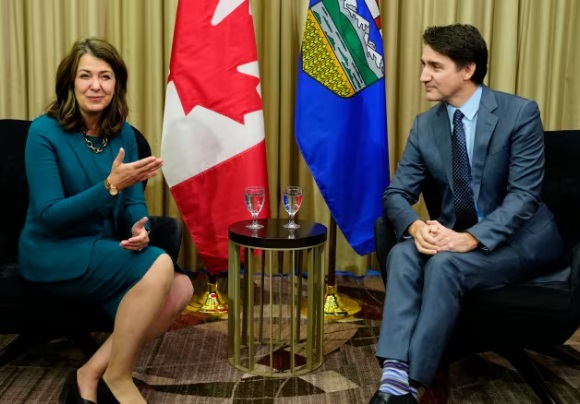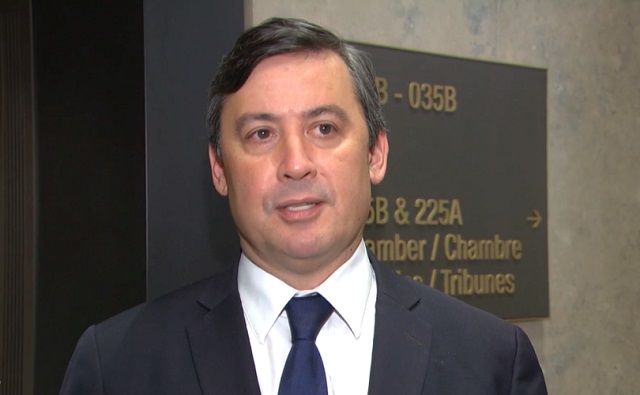Alberta
History, Controversy & Indigenous Involvement – Death of Keystone XL

For many, few stories have been as captivating and as frustrating as that of the stop-and-start Keystone XL pipeline project, which appears to officially be reaching its end following the inauguration of President Joe Biden on Wednesday, January 20, 2021.
 The Keystone XL pipeline extension was originally proposed by TC Energy in 2008 as the 4th phase of the existing Keystone Pipeline System, which traverses Canada and the United States. The 1,947 km pipeline would run from Hardisty, Alberta, to Steele City, Nebraska, dramatically increasing the transportation capacity of Alberta crude oil to 830,000 barrels per day.
The Keystone XL pipeline extension was originally proposed by TC Energy in 2008 as the 4th phase of the existing Keystone Pipeline System, which traverses Canada and the United States. The 1,947 km pipeline would run from Hardisty, Alberta, to Steele City, Nebraska, dramatically increasing the transportation capacity of Alberta crude oil to 830,000 barrels per day.
The National Energy Board first approved the Keystone XL application in March 2010, with a number of conditions in place to protect environmental and landowner interests.
 Opposition towards the project developed quickly, largely on the basis of environmental concerns. Environmental assessments released by the U.S. State Department, which established the pipeline would have “limited environmental impact”, were met with public backlash and mass protests.
Opposition towards the project developed quickly, largely on the basis of environmental concerns. Environmental assessments released by the U.S. State Department, which established the pipeline would have “limited environmental impact”, were met with public backlash and mass protests.
In 2011, the State Department required TC Energy (then TransCanada) to reroute the pipeline around an “ecologically sensitive” area in Nebraska, to which TC Energy agreed.
 In January 2012, President Barack Obama rejected the Keystone XL, but invited TC to submit another application, which was done in May 2012.
In January 2012, President Barack Obama rejected the Keystone XL, but invited TC to submit another application, which was done in May 2012.
Following another 3 years of legislative debate, protest and controversial back and forth, Obama vetoed the bill to build the Keystone XL on February 24, 2015.
On November 6, 2015, the Obama Administration once again rejected TC Energy’s application to build the Keystone XL pipeline.
In this context, tensions continued to rise, as massive amounts of money and potential jobs hung in the balance with no end in sight. In 2016, Republican presidential candidate Donald Trump included the Keystone XL in his campaign, vowing to approve it if elected as President of the United States.
 Following his election in November 2016, President Trump signed an executive order approving the Keystone XL pipeline, along with an order requiring American pipelines be built with American steel.
Following his election in November 2016, President Trump signed an executive order approving the Keystone XL pipeline, along with an order requiring American pipelines be built with American steel.
In late 2018, the pipeline’s construction was delayed once again by a U.S. federal judge, citing environmental impact.
Construction resumed in April 2020, following a pledge from Alberta Premier Jason Kenney to invest CAD$1.5 billion in the project in March 2020. Outrage from environmental and Indigenous groups continued in the wake of the announcement.
In May 2020, then-presumed presidential nominee Joe Biden shared plans to shutdown the Keystone XL as a part of his campaign. (1)
 It is January 2021, and Biden has indeed followed through on his claim to scrap the pipeline. To the outrage of many Albertans and their fellow Canadians, one of Biden’s first executive orders as President of the United States, just hours after his inauguration, was to revoke TC Energy’s permit for the Keystone XL.
It is January 2021, and Biden has indeed followed through on his claim to scrap the pipeline. To the outrage of many Albertans and their fellow Canadians, one of Biden’s first executive orders as President of the United States, just hours after his inauguration, was to revoke TC Energy’s permit for the Keystone XL.
As of December 2020, more than 150 kilometres of pipeline had already been installed. According to Financial Post, the cancellation leaves behind approximately 48,000 tons of steel.
Biden’s decision has served to deepen the division between pro and anti-pipeline groups, including the opposing positions expressed by a number of Canadian Indigenous groups.
Over the course of the past decade, Indigenous opposition to the pipeline has been well documented through a series of protests and petitions, featuring countless Canadians who rallied in support of First Nations groups, environmental concerns and land rights.
In 2016, Donald Trump’s renewed approval of the pipeline was met with equally renewed opposition by those groups determined to halt the project once and for all. “The fight to kill the Keystone XL pipeline begins anew,” said Dallas Goldtooth, lead organizer for the Indigenous Environmental Network in 2017, “and Donald Trump should expect far greater resistance than ever before.”
On the other side of this opposition, the historic formation of the Natural Law Energy coalition came as a shock to many. Natural Law Energy (NLE) is a coalition of First Nations groups who expressed their support for the Keystone XL pipeline by pursuing investment opportunities with TC Energy. Little Pine First Nation, Louis Bull Tribe, Nekaneet Cree First Nation, Ermineskin Cree Nation and Akamihk Montana Cree First Nation came together to form the coalition with the ambition of providing First Nations groups with financial resources and opportunities.
 For Chief Alvin Francis of Nekaneet First Nation in Saskatchewan, the pipeline presented an opportunity to secure funding for indigenous communities and aid indigenous youth in their schooling or business endeavors for years to come. “It’s about making life better for all of our youth,” he told the Globe and Mail in November 2020.
For Chief Alvin Francis of Nekaneet First Nation in Saskatchewan, the pipeline presented an opportunity to secure funding for indigenous communities and aid indigenous youth in their schooling or business endeavors for years to come. “It’s about making life better for all of our youth,” he told the Globe and Mail in November 2020.
Just as Indigenous anti-pipeline groups celebrate the latest development, Biden’s executive order to cancel the pipeline once again has been met with disappointment from members of the NLE and its supporters.
 Recent developments over the multi-billion dollar Keystone XL have also led to heated discussions between the Kenney Administration and Canadian Prime Minister Justin Trudeau. Kenney’s response to the Canadian Federal Government as well as the Biden Administration was one of absolute disappointment and anger, as Alberta’s oil and gas industry sustained another massive hit. He went as far as to call upon Trudeau to impose economic sanctions on the United States.
Recent developments over the multi-billion dollar Keystone XL have also led to heated discussions between the Kenney Administration and Canadian Prime Minister Justin Trudeau. Kenney’s response to the Canadian Federal Government as well as the Biden Administration was one of absolute disappointment and anger, as Alberta’s oil and gas industry sustained another massive hit. He went as far as to call upon Trudeau to impose economic sanctions on the United States.
While many have echoed Kenney’s sentiments regarding the cancellation of the pipeline and the Biden Administrations early treatment of Canada and the province of Alberta, others have identified this development as an opportunity for Alberta to diversify. Under the current economic circumstances, can Alberta overcome the loss of the Keystone XL? Should Alberta focus on diversifying? Given the ongoing global shift towards renewable energy technology, can we afford not to?
For more stories, visit Todayville Calgary.
Alberta
Danielle Smith warns arsonists who start wildfires in Alberta that they will be held accountable

From LifeSiteNews
The Alberta government has created an ad campaign highlighting the fact that most fires are caused by humans and not ‘climate change,’ as many left-leaning politicians claim.
In preparation for the so-called wildfire “season,” Alberta Premier Danielle Smith sternly warned anyone caught starting blazes in her province, including arsonists, that they will face charges and be held fully “liable” for all costs associated with the fires.
“As we approach the wildfire season, it is important to understand that 67% of wildfires in Alberta are started by people,” Smith posted Monday on X.
“If you start a wildfire, you can be charged, fined, and held liable for all costs associated with fighting the wildfire.”
Smith made the comments after last year revealing that most of the wildfires in her province (500 of the 650) were caused by humans and not “climate change,” as has been pushed by the legacy media and opposition politicians.
“All I know is in my province we have 650 fires and 500 of them were human caused,” she said, “so we have to make sure that when people know that when it’s dry out there and we get into forest fire season that they’re being a lot more careful because anytime you end up with an ignition that happens it can have devastating consequences.”
To go along with Smith’s Monday message, the Alberta government has also created an ad campaign highlighting the fact that most fires are caused by humans and not “climate change,” as many left-leaning politicians claim.
As reported by LifeSiteNews last year, Smith ordered arson investigators to look into why some of the wildfires that raged across the vast expanse of the province had “no known cause” shortly after they spread.
During the campaign of Alberta’s 2023 election, Smith, whose United Conservative Party won a majority government, had to pause to deal with many wildfires that suddenly, out of nowhere, ravaged the province. The fires came on suddenly and uncharacteristically considering the heavy snowfall in the province in early March and rain in April.
LifeSiteNews reported that despite the arrest of multiple arsonists, Canada’s mainstream media and the federal government have been pushing a narrative attributing the recent wildfires to “climate change.”
Indeed, in January, LifeSiteNews reported that a man from Quebec admitted to starting 14 forest fires himself. This put a chill to the legacy media’s push that the fires in the province were caused by “climate change.”
However, statistics from Canada’s National Fire Database show that wildfires have gone down in recent years and peaked in 1989.
As for Canadian Prime Minister Justin Trudeau, he has repeatedly used “climate change” and forest fires as a catalyst for propping up his government’s much-maligned carbon tax, which Smith opposes. He has blamed the fires on “climate change.”
A June 2017 peer-reviewed study by two scientists and a veteran statistician confirmed that most of the recent global warming data have been “fabricated by climate scientists to make it look more frightening.”
Trudeau has been calling for increased bans on Canada’s natural resources, of which Alberta has in abundance.
Smith has vowed to fight Trudeau on his attacks against Alberta’s oil and gas industry.
The reduction and eventual elimination of so-called “fossil fuels” and a transition to unreliable “green” energy has also been pushed by the World Economic Forum (WEF), the globalist group behind the socialist “Great Reset” agenda in which Trudeau and some of his cabinet are involved.
Alberta
Free Alberta Strategy backing Smith’s Provincial Priorities Act

News release from Free Alberta Strategy
Premier Danielle Smith had a message for Ottawa last week.
Keep out.
On Wednesday, the Premier rolled out her latest weapon in the fight against federal intrusions into provincial jurisdiction.
If passed, Bill 18 – the Provincial Priorities Act – aims to align federal funding with provincial priorities, ensuring that said funding reflects Alberta’s interests.
The legislation stipulates that any agreements between the federal government and any provincial entities – including municipalities – must receive provincial approval to be considered valid.
Smith has already given it a nickname: “the stay-out-of-my-backyard bill.”
It’s an apt description of the legislation, especially considering that’s what the federal government has been doing for years – encroaching into Alberta’s jurisdiction.
The legislation shouldn’t come as a surprise to anyone.
We all know that most deals the Alberta government enters into with the federal government don’t work out for Albertans.
We end up paying more in federal taxes than gets spent in federal spending on the programs.
The programs come laden with restrictive conditions that undermine our autonomy, and are often detrimental to our ability to provide the services.
This is especially true with regard to the recent agreement between Ottawa and the provinces that allows the federal government to nationalize childcare.
The childcare agreement has come under heavy criticism due to funding shortfalls in the deal.
It also applies to housing, where despite Alberta accounting for 12% of the national population and experiencing the most rapid population growth, it received a mere 2.5% of the total $1.5 billion in federal housing funding last summer.
Jason Nixon, Minister of Seniors, Community and Social Services, is in charge of housing in Alberta – which is provincial jurisdiction.
On the latest rollout of conditional federal housing handouts, Nixon isn’t buying.
“We will not be bribed, with our own money, to increase the time it takes to get homes built with green energy that makes homes more expensive.”
The theory also applies to the federal government’s latest gambit – doing an end-around provincial negotiations and going directly to municipalities, who seem more interested in taking the money than the conditions attached.
Municipalities are provincial jurisdiction.
Bill 18 mandates that entities within Alberta’s jurisdiction, such as municipalities, universities, school boards, housing agencies, and health authorities, must seek the province’s approval before engaging in, modifying, extending, or renewing agreements with Ottawa.
Agreements between the federal government and provincial entities lacking Alberta’s endorsement will be deemed illegal under this legislation.
That’s Premier Smith’s message.
She’s had enough of it.
“It is not unreasonable for Alberta to demand fairness from Ottawa. They have shown time and again that they will put ideology before practicality, which hurts Alberta families and our economy. We are not going to apologize for continuing to stand up for Albertans so we get the best deal possible.
“Since Ottawa refuses to acknowledge the negative impacts of its overreach, even after losing battles at the Federal and Supreme Courts, we are putting in additional measures to protect our provincial jurisdiction to ensure our province receives our fair share of federal tax dollars and that those dollars are spent on the priorities of Albertans.”
Municipal Affairs Minister Ric McIver had additional thoughts:
“For years, the federal government has been imposing its agenda on Alberta taxpayers through direct funding agreements with cities and other provincial organizations. Not only does Alberta not receive its per capita share of federal taxpayer dollars, the money we do receive is often directed towards initiatives that don’t align with Albertan’s priorities.
“Albertans from all corners of the province expect our federal share of taxes for roads, infrastructure, housing and other priorities – not federal government political pet projects and programs in select communities.”
The Provincial Priorities Act is based on existing provincial legislation in Quebec – called “An Act Respecting the Ministère du Conseil executif” – which prohibits any municipal body from entering into or negotiating an agreement with the federal government or its agencies without express authorization from the Quebec government.
That’s right – the Quebec government has the same rule!
So, this boils down to the same argument we’ve been making for years – if Ottawa wants to step into our backyard, it must first seek Alberta’s approval.
Enough is enough – we won’t stand idly by as our interests are trampled upon.
It’s time for Ottawa to recognize Alberta’s autonomy and respect our right to determine our own future.
At the Free Alberta Strategy, we know that constant vigilance is necessary – for every fence we put up, the federal government tries to find a way around it.
We’ll continue to bring you information about what’s happening in Alberta’s backyard and fighting to keep Ottawa out.
The Free Alberta Strategy Team
-

 Jordan Peterson2 days ago
Jordan Peterson2 days agoJordan Peterson slams CBC for only interviewing pro-LGBT doctors about UK report on child ‘sex changes’
-

 Addictions2 days ago
Addictions2 days agoLiberal MP blasts Trudeau-backed ‘safe supply’ drug programs, linking them to ‘chaos’ in cities
-

 International2 days ago
International2 days agoBrussels NatCon conference will continue freely after court overturns police barricade
-

 International18 hours ago
International18 hours agoTelegram founder tells Tucker Carlson that US intel agents tried to spy on user messages
-

 Agriculture2 days ago
Agriculture2 days agoBill C-282, now in the Senate, risks holding back other economic sectors and further burdening consumers
-

 Business18 hours ago
Business18 hours agoNew capital gains hike won’t work as claimed but will harm the economy
-

 Bruce Dowbiggin16 hours ago
Bruce Dowbiggin16 hours agoWhy Are Canadian Mayors So Far Left And Out Of Touch?
-

 Business13 hours ago
Business13 hours agoCanada’s economy has stagnated despite Ottawa’s spin








